 Petzlover
Petzlover Australian Red Heeler is originated from Australia but Dorgi is originated from United Kingdom. Australian Red Heeler may grow 21 cm / 9 inches higher than Dorgi. Both Australian Red Heeler and Dorgi are having almost same weight. Both Australian Red Heeler and Dorgi has same life span. Both Australian Red Heeler and Dorgi has almost same litter size. Australian Red Heeler requires Moderate Maintenance. But Dorgi requires Low Maintenance
Australian Red Heeler is originated from Australia but Dorgi is originated from United Kingdom. Australian Red Heeler may grow 21 cm / 9 inches higher than Dorgi. Both Australian Red Heeler and Dorgi are having almost same weight. Both Australian Red Heeler and Dorgi has same life span. Both Australian Red Heeler and Dorgi has almost same litter size. Australian Red Heeler requires Moderate Maintenance. But Dorgi requires Low Maintenance
 When George Hall arrived in the New South Wales Colony in 1802 he set about ‘creating’ a tough working- or herding dog. By crossing Australia’s native Dingoes with Collies as well as with other herding dogs, the robust Red Heeler, also known as the Australian Cattle Dog came into being. Today he is a thick-set dog, ideally suited to working livestock.
When George Hall arrived in the New South Wales Colony in 1802 he set about ‘creating’ a tough working- or herding dog. By crossing Australia’s native Dingoes with Collies as well as with other herding dogs, the robust Red Heeler, also known as the Australian Cattle Dog came into being. Today he is a thick-set dog, ideally suited to working livestock.
Ranchers, particularly, were impressed with the breed’s toughness and they were sought after on cattle stations. The name actually comes from them when the dogs are herding animals, they nip at their heels to get them moving.
The Blue Heeler and the Red Heeler breed are the exact same dog, but just different colors. These Australian cattle dogs originated in Australia in the mid-1800s and adapted well to the harsh desert environment of the outback.
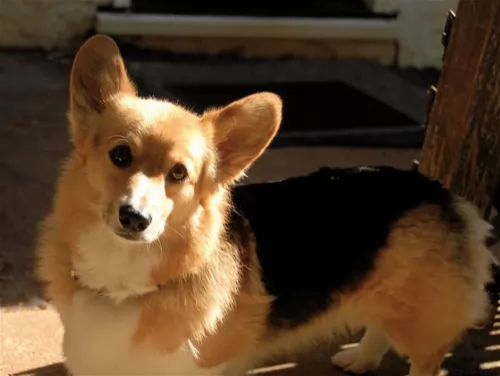 The Dorgi is a designer crossbreed whose origins are not entirely known, however it is a popular breed, being a mix between a Dachshund and a Pembroke Welsh Corgi.
The Dorgi is a designer crossbreed whose origins are not entirely known, however it is a popular breed, being a mix between a Dachshund and a Pembroke Welsh Corgi.
The Dorgi itself is new breed and therefore has a short history, but both dogs used to develop the Dorgi – the Dachshund and the Corgi – have their own unique histories.
The Dachshund originated in Germany in the 1500s and the Pembroke Welsh Corgi originated in the United Kingdom centuries ago.
 The Red Heeler or Australian Cattle Dog is a sturdy, muscular dog with ears that are pricked and with dark, alert eyes. The tail is long. The neck, shoulders and legs of the Red Heeler are strong and muscular. The dog is longer than tall – the length of the body is greater than the height at the withers. A well fed, well exercised, well cared for Red Heeler will weight roughly 15–22 kilograms.
The Red Heeler or Australian Cattle Dog is a sturdy, muscular dog with ears that are pricked and with dark, alert eyes. The tail is long. The neck, shoulders and legs of the Red Heeler are strong and muscular. The dog is longer than tall – the length of the body is greater than the height at the withers. A well fed, well exercised, well cared for Red Heeler will weight roughly 15–22 kilograms.
There are 2 coat colours of the Reeler – red and blue, but there are are lesser varieties such as chocolate, cream, blue mottled, brindle and some with white markings. It is interesting to note that with both the Red- and the Blue Heeler, puppies are generally born white, with the coat turning to red as they mature.
These Australian Cattle Dogs display patches of solid colour, and you might well find masks over one or both eyes and a white tip to the tail. Both the Red and Blue Heeler can have a white star on the forehead which is referred to as the Bentley Mark. The Heelers have a double coat - short, straight outer hairs while the undercoat is short, fine and dense. Despite their short coat, they shed a lot.
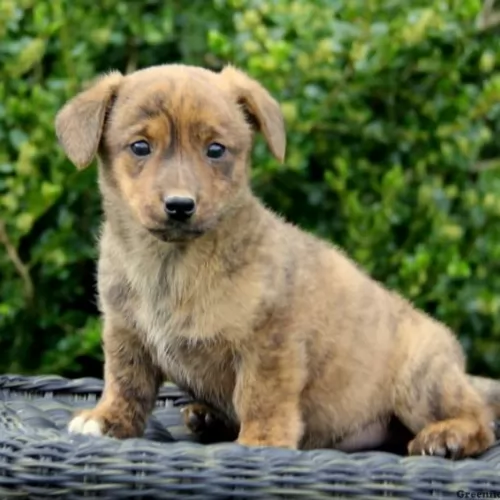 The Dorgi is known for his long body, short legs and the erect ears of the corgi. He is a small dog, measuring roughly 20-30cm in height and weighing in the region of 6 – 12kg.
The Dorgi is known for his long body, short legs and the erect ears of the corgi. He is a small dog, measuring roughly 20-30cm in height and weighing in the region of 6 – 12kg.
Many people also refer to him as the sausage dog. The look of your Dorgi can depend quite a bit on whether he looks more like a Corgi or a Dachshund, so for instance the coat can be short and smooth, or thick and coarse.
They can surprise you with their looks, and some are born with long tails while others are born with bobtails. The coat comes in many colors too, from tan to brown to black and white or a mixture of these colors.
The Dorgi is full of the joys of life, just loving all the attention he gets from his human family. Of course, in return for this affection, he offers love, loyalty and plenty of fun and games.
He is an energetic breed too and is always ready to join in any games with the children in the home as well as with cats and dogs living in the home too.
Training and socialization will also be needed for the Dorgi who is intelligent and easy to train. He has wonderful behavior when trained, being obedient and relaxed around visitors to your home.
Social and sweet, this is one little dog who is guaranteed to make a wonderful pet and companion, as he loves human companionship and never wants to be left alone for too long. He is alert too, so while he is small and no real threat to an intruder, he is willing to do what it takes to protect his human family and to bark to alert you.
 Your Australian Red Heeler needs plenty of exercise but also plenty of companionship too from his human family. He is an affectionate, playful pet but is reserved with people he doesn’t know. When socialized he is patient with children in the home but he does still have the tendency to herd them and nip at their heels. The dog builds up a strong bond with his human family, and is protective toward them, being happy to be close to his owner’s side.
Your Australian Red Heeler needs plenty of exercise but also plenty of companionship too from his human family. He is an affectionate, playful pet but is reserved with people he doesn’t know. When socialized he is patient with children in the home but he does still have the tendency to herd them and nip at their heels. The dog builds up a strong bond with his human family, and is protective toward them, being happy to be close to his owner’s side.
Red Heelers need activities and lots of room to play, and they therefore won’t adapt to apartment living. If you don’t live on a farm, don’t neglect your working dog as he will need lots of rough and tumble games and activities to keep him from boredom. Treat your Australian Red Heeler with the love, patience and kindness and you’ll bring out the very best from this active, loyal fur-friend of yours.
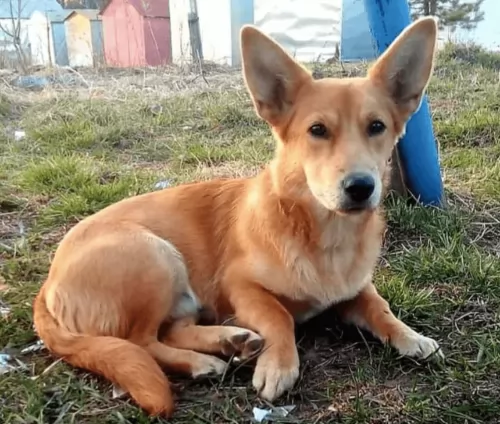 The Dorgi is such a sweet little designer breed of dog that happens to also be low maintenance. Apart from being a little dog full of energy and attitude, he is loving and loyal as a family pet too, being gentle around children and making a splendid pet.
The Dorgi is such a sweet little designer breed of dog that happens to also be low maintenance. Apart from being a little dog full of energy and attitude, he is loving and loyal as a family pet too, being gentle around children and making a splendid pet.
He isn’t going to eat you out of hearth and home either and he is a fairly healthy breed as well.
When you bring a Dorgi into your home, you’re bringing in a whole lot of happiness as he is an awesome family member who wants to be counted in on everything the do.
 The Australian Cattle Dog is quite often affected by progressive retinal atrophy, an eye condition where the rods and cones in the retina of the eye deteriorate later in life, and it could lead to blindness. This eye illness is an autosomal recessive trait, and even if the dog doesn’t develop the condition himself, he can be a carrier of the affected gene.
The Australian Cattle Dog is quite often affected by progressive retinal atrophy, an eye condition where the rods and cones in the retina of the eye deteriorate later in life, and it could lead to blindness. This eye illness is an autosomal recessive trait, and even if the dog doesn’t develop the condition himself, he can be a carrier of the affected gene.
The Heeler is just bursting with personality and energy and a study of dogs diagnosed at veterinary colleges described fractures and ligament tears as one of the most common conditions treated with the Australian Red Heeler.
You love your Australian Red Heeler and you want to take good care of him. Check with your vet because at 8 weeks he should be starting with his first puppy vaccinations.
To keep your best friend healthy and happy, watch his diet, ensure he gets plenty of exercise, brush his teeth regularly to remove plaque build-up, and always call your veterinarian when you see he is ill and isn’t his usual boisterous self.
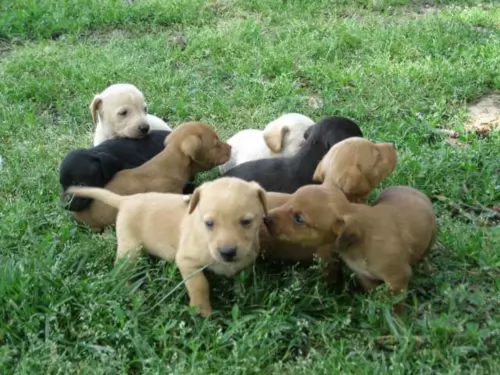 Because the Dorgi is a hybrid breed, he promises to be quite healthy, but on the other hand, it could be that he inherits some of the common health problems associated with either the Corgi or the Dachshund.
Because the Dorgi is a hybrid breed, he promises to be quite healthy, but on the other hand, it could be that he inherits some of the common health problems associated with either the Corgi or the Dachshund.
Obesity is always a problem with a small dog, as they’re so sweet, you just want to be popping treats into their mouths all the time. It is important to follow a healthy diet for your pet however if you want to stave off common dog disorders.
An obese dog faces a shorter life expectancy, and some of the major health issues that an obese Dorgi has to contend with is diabetes, osteoarthritis, high blood pressure and cancer among others. Certainly better, healthier pet food choices can help save you money on vets fees.
Diabetes in canines is just as serious as in humans and its a glucose-insulin complication where the pancreas isn’t producing enough insulin.
Sugars build-up in the blood and these can cause damage to your dog’s eyes, heart and kidneys. You may notice your pet gaining weight, being more thirsty, being tired and having cloudy eyes which could be indicative of cataracts. Take your pet to the vet as insulin shots may be required.
 The Australian Red Heeler is a low maintenance dog. He does shed quite a bit so you’ll need to brush his coat at least twice a week to remove loose hairs and to keep his coat lustrous. When your dog has been in a particularly dusty area, you you wipe his coat down with a damp cloth. As with all dogs, you’ll want to check his teeth, ears, eyes and nails regularly to avoid health problems.
The Australian Red Heeler is a low maintenance dog. He does shed quite a bit so you’ll need to brush his coat at least twice a week to remove loose hairs and to keep his coat lustrous. When your dog has been in a particularly dusty area, you you wipe his coat down with a damp cloth. As with all dogs, you’ll want to check his teeth, ears, eyes and nails regularly to avoid health problems.
If you care for your working- and herding dog you’ll train him to that he becomes a good family dog and companion. The Red Heeler has plenty of energy and stamina and if he grows up untrained and un-socialized, you could see him becoming aggressive towards other animals and even your own children. He certainly becomes over-protective of his territory if not socialized. Train him as he is an intelligent breed and responds well to training.
Any vet will tell you of the critical importance of a proper diet and exercise routine for your dog. He’s an active, smart dog with loads of energy and you want to keep his diet consistent with this energy. Speak to your vet about what food would suit your pet best, because a high quality diet appropriate to his age, his body size and his energy levels will be important. Along with high quality foods which include a good intake of raw meat, your dog must always have access to a bowl of fresh, cool water.
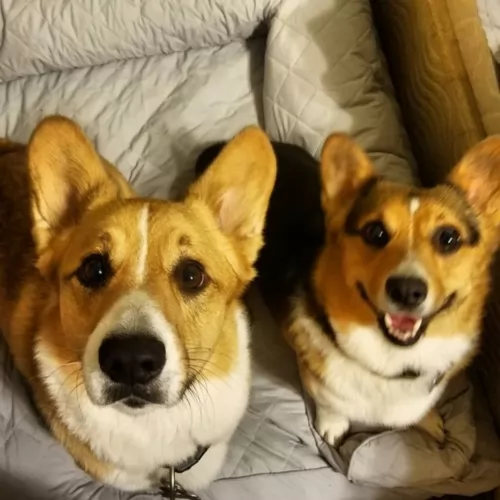 Your Dorgi’s coat will be shortish, and shedding is minimal so a good brush twice a week will be perfect for this pet of yours, and he will love the attention you give him while doing so.
Your Dorgi’s coat will be shortish, and shedding is minimal so a good brush twice a week will be perfect for this pet of yours, and he will love the attention you give him while doing so.
He is an active breed so he will require regular exercise. Take him with you on your walks. Even if you have a small garden, he’ll love fetching a ball for you.
If you give your Dorgi commercially manufactured dog food, remember to be guided by the feeding recommendations to avoid obesity.
Its always a good idea to add in some raw meat to his diet to keep his nose wet and his skin free from being dry and itchy. You can also add in some cooked brown rice, vegetables and chicken for variety.
Always ensure that a bowl of fresh water is constantly available.